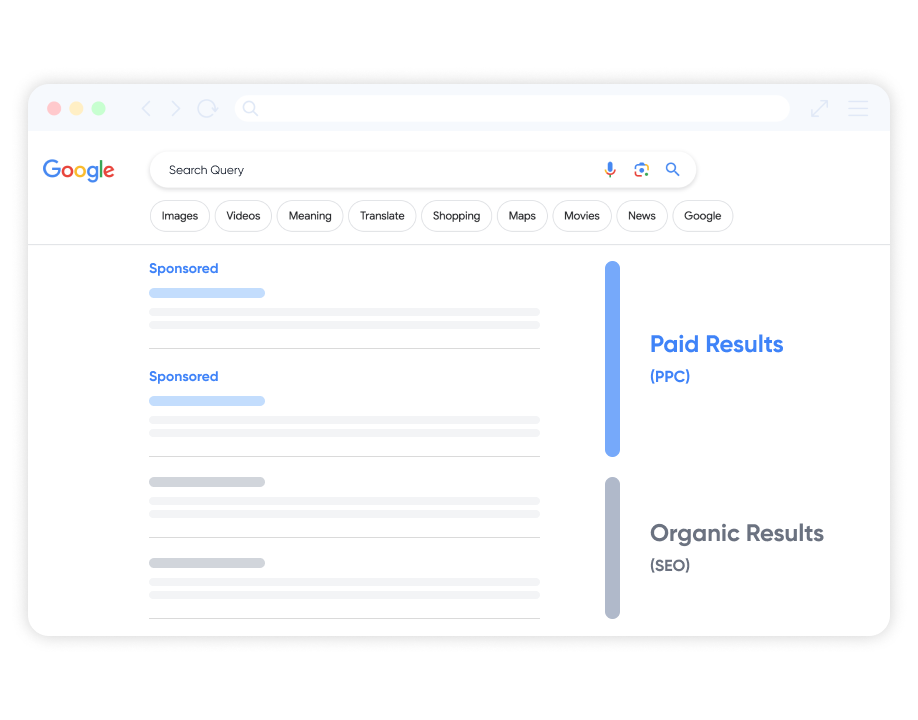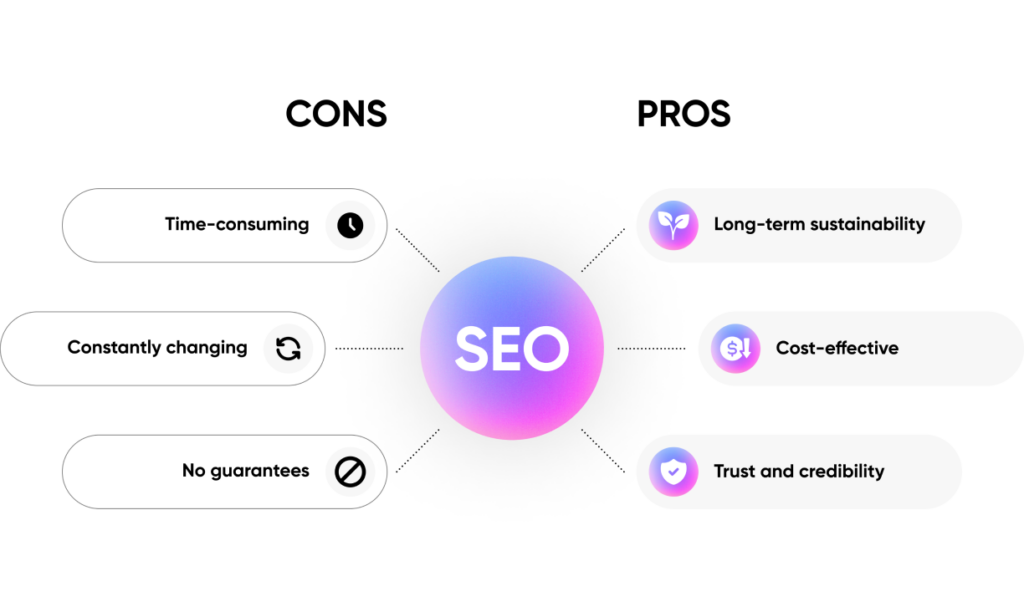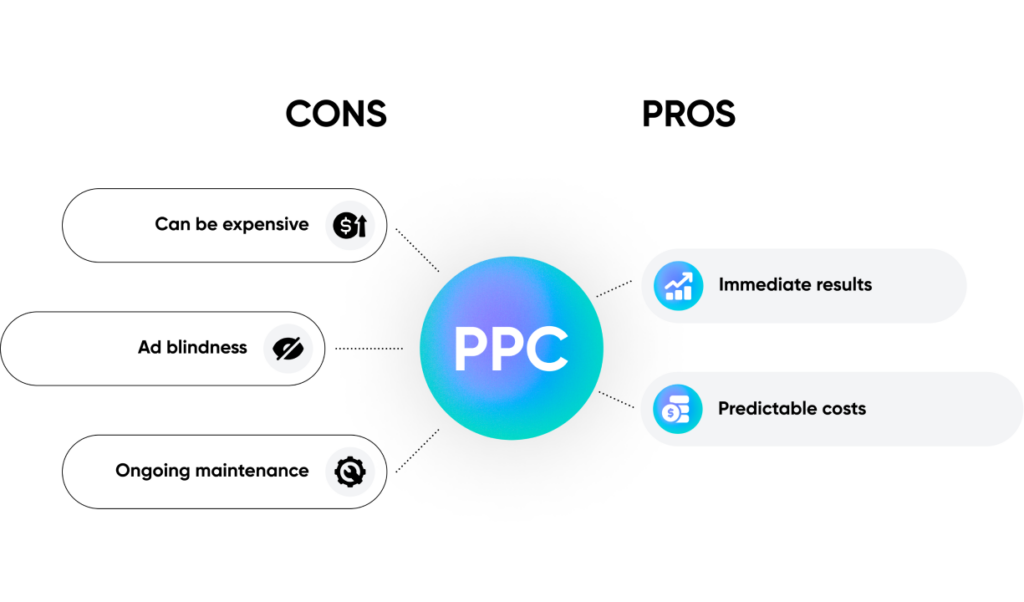Table of Contents
- What is SEO for in 2025?
- What is PPC, and how does it work?
- What are the differences between SEO and PPC?
- Why is SEO low-cost in comparison with PPC?
- Which has more control limitations, SEO or PPC?
- What are the differences between SEO and PPC regarding search results?
- Why does SEO have longer-term benefits in comparison with PPC?
- SEO or PPC, which one has more effective strategies for driving traffic to a website?
- What are the pros and cons of SEO and PPC?
- Consult OWDT for your SEO & PPC projects
Making a confident call in the SEO vs PPC debate is rarely simple. Both channels can move the needle, but in very different ways, so the real question isn’t “Which is best?” but “Which is best for me?” Before you pour budget or bandwidth into either tactic, you first need to grasp the core difference between SEO and PPC: organic optimisation builds authority and traffic gradually, while paid search buys you immediate, targeted visibility for as long as your ads are funded.
This article demystifies those differences, cost, speed, control, sustainability, and ROI, so you can match the right strategy (or the right mix of strategies) to your current goals, growth stage, and competitive landscape.

What is SEO for in 2025?
Search‑engine optimisation still pursues the same North Star: reliable, high‑intent traffic. But the way we earn that traffic has evolved. Google’s AI Overviews, Microsoft Copilot, and ChatGPT Browse have introduced an “answer layer” that appears above, or even replaces, the familiar blue links. The goal today is to become the page these systems quote and the result users click. This is where modern SEO services play a vital role, combining strategy, content, and technology to secure visibility across both traditional and AI-driven surfaces.
Why SEO matters more than ever
- Protect organic clicks. When an AI Overview fires, the #1 traditional listing loses roughly 34 % of its click-throughs¹.
- Keep showing up as AI spreads. Trackers put AI Overviews in anywhere from 13 % of Google queries² to more than 50 % for broad‑information searches³, and the share keeps climbing month‑over‑month.
- Feed the models quality data. Google’s EEAT and “information‑gain” signals reward first‑hand insight, exactly the content large language models prefer to cite.
How modern SEO works
- Technical SEO & on‑page fundamentals – fast pages, crawlable architecture, tight intent‑matched copy, and schema that clarifies context for both ranking algorithms and LLM parsers.
- Generative‑Engine Optimisation (GEO) – formatting content so AI systems can lift concise, source‑backed answers (think question sub‑heads, bullet summaries, and explicit citations).
- Authority building – quality backlinks, avoiding spammy links, branded mentions, and publisher partnerships that boost both ranking signals and AI “confidence” scores.
- Continuous measurement – tracking zero‑click impressions, AI‑panel citations, and overlap with paid keywords to spot new opportunities.
What is PPC, and how does it work?
PPC stands for “pay-per-click,” a type of online advertising where advertisers pay each time a user clicks on one of their ads. This type of advertising is often used on search engines like Google or Bing and on social media platforms like Facebook and Instagram.
In a PPC campaign, advertisers bid on specific keywords or phrases relevant to their target audience. When a user enters a search query that matches the advertiser’s keywords, the search engine will display relevant ads on the search results page. If the user clicks on one of these ads, the advertiser will be charged a certain amount, which is determined by the bidding price and competition for that keyword.
PPC ads appear at the top of search results pages, above organic search results, and are marked as “sponsored” or “ad” to differentiate them from organic results. They can also appear on other websites or social media platforms as display ads or sponsored posts.
PPC campaigns can be highly effective for driving targeted traffic to a website or landing page, as advertisers can target specific keywords, demographics, and locations to reach their desired audience. However, it can also be a competitive and costly form of advertising, as advertisers must bid against each other for ad placement and pay for each click on their ads.
What are the differences between SEO and PPC?
SEO vs PPC refers to two distinct strategies for driving traffic to a website or landing page, and there are several key differences between them:
- Cost: One of the differences between SEO and PPC lies in their associated costs. SEO is generally a lower-cost option, as it involves optimizing a website or content for search engines without paying for ad placement. On the other hand, PPC requires advertisers to pay for each click on their ads.
- Timing: In the comparison of SEO vs Paid Search, timing is a crucial factor. SEO is a long-term strategy demanding continual optimization for enhanced rankings and sustained visibility in search results. It may take weeks or even months to witness substantial advancements in rankings and traffic. Conversely, Paid Search can swiftly generate traffic to a website, but its effects cease once the campaign concludes.
- Control: With SEO, you have limited control over when and how your website appears in search results. Your rankings depend on various factors, including the relevance and quality of your website content strategy, backlinks, and user experience. With PPC, you have more control over when and how your ads appear, including targeting specific keywords, demographics, and locations.
- Sustainability: SEO offers a sustainable traffic source because it is based on organic search results. In contrast, PPC is not sustainable because it relies on continuous investment to maintain the campaign.
- Click-through rates: Organic search results tend to have higher click-through rates than PPC ads, as users may perceive them as more credible and trustworthy.
That said, many businesses now pursue SEO and PPC synergy to maximize visibility and conversions, leveraging the strengths of both strategies for a more powerful digital marketing approach.
Take Action
Learn more about our SEO services and options available to you, or contact our specialists to discuss how we can realize your vision.
Why is SEO low-cost in comparison with PPC?
SEO is often seen as a low-cost digital marketing strategy compared to PPC advertising for a few reasons:
- Organic search results are free: With SEO, you aim to rank your website organically in search engine results pages (SERPs), meaning you don’t have to pay for clicks or impressions. This contrasts with PPC, where you pay each time someone clicks on your ad.
- Long-term benefits: SEO is a long-term strategy that focuses on building your website’s authority and relevance, which can result in sustained traffic and improved rankings over time. In contrast, PPC advertising typically provides short-term gains and requires ongoing investment.
- Targeted traffic: SEO helps you optimize your website for keywords and phrases relevant to your business, which can attract highly targeted traffic. In contrast, PPC advertising can sometimes attract less qualified leads, leading to a higher conversion cost.
That being said, SEO does require ongoing effort and investment to achieve and maintain rankings, and it can take some time to see results. PPC, on the other hand, can provide faster results and more control over targeting and messaging. Ultimately, the best approach will depend on your business goals and budget.
Which has more control limitations, SEO or PPC?
In case of PPC vs SEO, control limitations make it difficult to determine which one has more restrictions.
SEO involves optimizing your website and content to improve your organic search engine rankings. While SEO can be effective in driving traffic to your website, it can be limited in a few ways:
- It can take time to see results: SEO is a long-term strategy that requires consistent effort and patience. To achieve sustainable growth, you need to consider all types of SEO, including technical, on-page, and off-page, as each plays a critical role in improving visibility and performance over time.
- Search engine algorithms are constantly changing: Search engines like Google are constantly updating their algorithms, making it challenging to keep up with the latest best practices and maintain rankings.
- Limited control over search results: While you can optimize your website and content for specific keywords, you don’t have full control over where your website ranks in search results.PPC advertising involves running ads on search engines and other platforms to drive traffic to your website. While PPC can be effective in driving targeted traffic to your website, it also has limitations:
- Ad fatigue: Over time, users may become less responsive to your ads, decreasing your click-through rates and driving up your cost per click.
Ultimately, both SEO and PPC have their own unique challenges and limitations. The best approach is to use a combination of both strategies to drive targeted traffic to your website.
What are the differences between SEO and PPC regarding search results?
Organic search results are the non-paid search results that appear on search engine results pages (SERPs) and immediately after the “Sponsored” links.
PPC ads appear above and below the organic search results on a SERP and are marked as “Ad” or “Sponsored.” Advertisers pay for each click on their ads, hence the name “pay-per-click.”
Why does SEO have longer-term benefits in comparison with PPC?
SEO can have longer benefits than PPC because it focuses on improving a website’s organic search visibility and earning traffic through non-paid search results. Once a website’s SEO is optimized, it can continue receiving organic traffic and maintain its search visibility for an extended period.
Here is another reason why SEO can have longer-lasting benefits than PPC:
SEO can earn backlinks: Backlinks are a crucial factor in the off-page SEO, as they are seen as a vote of confidence from other websites. A website with a strong backlink profile can maintain its authority and ranking position for a long time, even without ongoing SEO efforts.
SEO or PPC, which one has more effective strategies for driving traffic to a website?
SEO and PPC can be effective strategies for driving traffic to a website. Which is more effective depends on various factors, such as your goals, budget, and target audience.
Both PPC and SEO play pivotal roles in driving traffic to a website. While PPC offers immediate results through paid advertisements, SEO is a long-term strategy focusing on organic search results. SEO entails optimizing your website with high-quality content, enhanced user experience, and strategic backlinking to boost visibility and attract organic traffic.
Although SEO may take time to yield results, it proves highly effective in directing high-quality traffic, especially when targeting pertinent keywords with substantial search volumes. On the other hand, PPC delivers instant visibility, albeit through paid means. The choice between PPC and SEO hinges on your specific goals, timelines, and budget constraints.
On the other hand, PPC is a short-term strategy that involves paying for ads to appear at the top of search results for specific keywords. By targeting the right keywords and creating compelling ad copy, you can attract highly targeted traffic to your website quickly. PPC can be highly effective at quickly driving traffic to your website and can be a good option for businesses with a larger PPC budget or needing immediate results.
What are the pros and cons of SEO and PPC?
SEO and PPC both have their own advantages and disadvantages. Here are some of the pros and cons of each:

Pros of SEO:
- Long-term sustainability: Once you start ranking high in search engine results, you can receive consistent traffic without paying for it.
- Cost-effective: Organic traffic is free, and SEO can be a cost-effective way to drive high-quality traffic to your website. While the price of SEO services can vary, the long-term value often outweighs the initial investment.
- Increased trust and credibility: High organic rankings can help establish your website as a credible and authoritative source in your industry.
Cons of SEO:
- Time-consuming: SEO can take time to produce results, as it involves creating high-quality content, building backlinks, and improving your website’s user experience.
- Constantly changing: Search engine algorithms constantly change, so you must keep up-to-date with the latest SEO best practices to maintain rankings.
- No guarantees: There are no guarantees that your website will rank high in search results, and competition for specific keywords can be fierce.

Pros of PPC:
- Immediate results: With PPC, you can start driving traffic to your website right away.
- Highly targeted: You can target specific keywords, demographics, and locations to reach your ideal audience.
- Predictable costs: With PPC, you can set a budget and only pay when someone clicks on your ad, which makes it easier to predict costs.
Cons of PPC:
- Can be expensive: Depending on the competition for your target keywords, PPC advertising can be expensive, limiting its effectiveness for small businesses with limited budgets.
- Ad blindness: Some people may ignore or block ads, which can reduce their effectiveness.
- Requires ongoing maintenance: To maintain the effectiveness of your PPC campaigns, you need to monitor and adjust them continually.
Why is SEO better than PPC in terms of cost and ease of execution?
When it comes to cost and ease of execution, SEO can be better than PPC in a number of ways:
- Lower cost: SEO can be a cost-effective way to drive traffic to your website, as organic traffic is free. While some costs may be associated with SEO, such as hiring an SEO specialist or creating high-quality content, these costs are generally lower than the ongoing costs of a PPC campaign.
- No ongoing costs: Once you have optimized your website for SEO and achieved high organic rankings, you can receive sustained traffic without paying for it. In contrast, PPC requires ongoing investment to maintain your visibility and results.
- Higher return on investment: SEO and user experience work hand in hand to attract and engage high-quality traffic. When your site is optimized for both search engines and users, it can lead to higher conversion rates and ultimately deliver a greater return on investment compared to PPC.
- Greater visibility: With SEO (local SEO), your website can appear in both the organic search results and Google’s business profile, increasing your visibility and driving more traffic to your website. In contrast, PPC ads are limited to the top of search results and may not be as visible to potential customers.
- Easier to scale: While SEO can take time to produce results, SEO is generally easier to scale than PPC, as you can continue to optimize your website and target new keywords to achieve greater visibility in search results.
- Long-term sustainability: SEO is a long-term strategy that can produce sustained traffic and leads over time. PPC, on the other hand, is a short-term solution that requires ongoing investment to maintain your results.
Take Action
Learn more about our marketing services and options available to you, or contact our specialists to discuss how we can realize your vision.
Consult OWDT for your SEO & PPC projects
As a professional web design company in Houston, OWDT has an expert team of web developers, designers, marketers, and SEO specialists who can be entrusted to optimize your brand and expand your business. Our awards and testimonials say more about us than we can. Our past clients are very successful and supremely satisfied with the work, guidance, and security that OWDT has provided and continues to provide 365/24/7.
Sources
[1] eMarketer. (2025). Google AI Overviews decrease CTRs by 34.5%, per new study.
[2] Semrush. (2025). Semrush Report: AI Overviews’ Impact on Search in 2025.
[3] WordStream. (2025). 34 AI Overviews Stats & Facts [2025].













